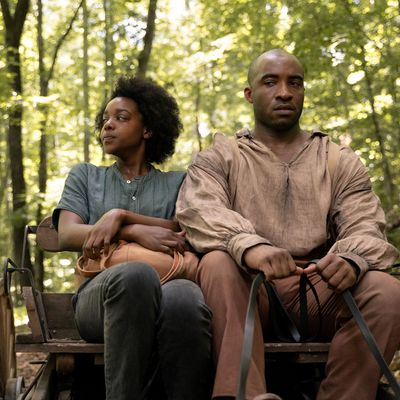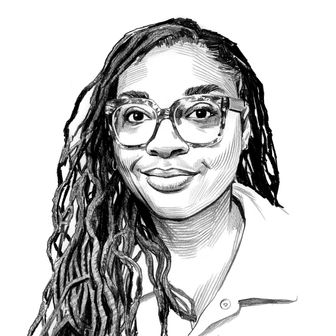
Ah, my favorite sci-fi trope has finally exposed itself in Kindred. The grandfather paradox. It’s something that is pretty much inevitable when telling stories that involve time travel. How much can we alter the past without irreparable damage to the present? It’s a fun and thought-provoking idea to toy with in the various scenarios sci-fi characters find themselves in. Not always fun for them, but engaging for the viewer. In Kindred, this paradox is less far-fetched: What would happen if a white person never raped your ancestor? What would that mean for you? Those are dark questions to ask but an inevitable situation the majority of Black Americans can relate to. It would be challenging, dare I say virtually impossible, to find a Black American without a lick of white blood. The average Black American has about 75 percent African ancestry. (I personally have even less than that, regardless of having two Black parents and four Black grandparents. Beyond that, I can’t make any promises.)
The ancestry and genetics of race are things society has trouble grappling with. Teaching the distinction between race, ethnicity, and nationality can be like explaining open heart surgery. So Halsey can identify as a woman of color based on her drops of Black blood, but I can’t identify as a white woman because of mine? I may have more white blood than she does Black. It doesn’t make sense because race is about how you are allowed to move in the world based on how you look, not what your genetic makeup is. This makes things especially complicated for Dana — who would she be without her white ancestor? Would she even exist? Is her existence worth the torture of her Black ancestors? Or is it all inevitable because if it’s not Rufus, it’ll be another man? If it’s not her ancestor, it’ll be someone else’s. No matter how you frame it, our identities are permanently bound to those who hate us.
Some Black science fiction fans refer to this as the Black Grandmother Paradox. Afrofuturism differentiates this from the grandfather paradox because the Black grandmother paradox “also acknowledges the ways in which time feels layered in Afrodiasporan traditions, where the past is always layered over the present moment — our ancestors reside with and within us, even if on a different temporal plane/scale.” Kindred illustrates this in a way that hadn’t been done before. Now that Dana has figured out that Rufus and Sarah’s daughter Carrie must have a child to ensure her very existence, she’s decided to do everything in her power to keep the two together.
Despite Kevin’s hesitation to return to the plantation, Dana clung onto him while being sent back to the past in the hallway closet. This time, Rufus has gotten what seems like alcohol poisoning. They find him in a barn with Carrie and a bottle of whisky and rush him to the cookhouse for coffee. Here, they meet Winnie, a new woman Tom bought as his concubine, working in the kitchen. Returning to their charade with the Weylins, Kevin looks after Rufus in the main house while Dana finds Olivia for answers. Olivia is even more insistent than before that she won’t return to the present; now that she’s so deeply entwined with the community, she feels she can serve a purpose. Instead, she wants to leave Maryland with Alice and head as North as possible. I’m still confused as to why Alice can’t come with them into the future, but Olivia argues that their situation could help a lot of people, and Dana warms up to the idea too.
Meanwhile, in the Weylin house, Kevin scrambles to come up with a plausible story to explain his sudden reappearance. It’s not too hard since the Weylins have Kevin to thank for their new income: Broadus signed his land over to Tom in exchange for his silence about his sexual orientation. Kevin lies and says he’s in financial trouble and needs somewhere to stay, so Tom brings him on as a music teacher for Rufus to earn his keep. He joins the Weylins for dinner, which ends in the entire table projectile vomiting due to a poisonous root Sarah put in the cake. The same cake that Rufus stole a slice of, causing him to become ill. Sarah poisoned the icing as part of her larger plan to push Winnie out of the cookhouse and regain a monopoly of cooking duties … and punish the Weylins.
This is where the episode goes entirely left. At dinner, Kevin finds out that Sarah and Carrie might be sold due to Rufus’ close relationship with Carrie, with Winnie taking over cooking duties. If Carrie is sold, she won’t have a baby with Rufus, so Dana concocts a plan to convince Winnie to run away, thus ensuring that Sarah and Carrie remain useful to the Weylins. After talking Winnie into running away with Olivia’s help (she lies and says Tom wants to sell her), Dana goes back to Kevin’s room in the Weylin house and … initiates sex with him?! I had to pause the episode, thinking, “I know I did not just watch a Black woman from the present go back in time and have sex with a white man she barely knows in the master’s house. Not in an adaptation of an Octavia Butler book that is specifically about Black womanhood.” Even as someone who has dated white men, I was appalled. I can confidently say that no Black woman I know would feel comfortable with something like that — at least not the ones who run in the same circles as me. I’m not here to kink shame or judge what turns other people on, but I am here to defend a piece of literature that means a lot to Black women of the African Diaspora.
Experiencing Butler’s Kindred through the lens of being a Black woman is severely different than the perspective of someone who hasn’t lived our lives. There are a lot of universal truths about the Black experience, but you can not ignore its commentary on womanhood. Kindred was originally about a man, but Butler changed the protagonist’s gender because she felt a woman would survive longer. Modern-day gender roles still require women to be submissive and never threatening. Men, especially Black men, have a very different experience; they’re painted as the perpetual aggressor, and an average Black man in modern times would not, as Butler put it, survive long enough to learn the “rules of submission.” Gender and gender roles are key elements of the story.
Sexual autonomy, the “choice” to submit to a white man, and the question of whether there even is a choice are huge themes in the novel. As Robert Cossely writes in the introduction, Dana “discovers that the moral choices of a late twentieth-century Black feminist cannot be exercised with impunity in the world of the slave state.” What is consent to a Black woman who is considered livestock? Is using your sexuality as a means of survival an immoral choice? These questions unfold in the book through Dana’s relationship with Rufus’ eventual concubine. I’ll leave the details out to avoid giving too much away, but know that Dana’s state of mind and her experience at the Weylin plantation would not have resulted in a romantic rendezvous in the main house with even her husband.
But, on the other hand, in an interview with Vulture, Branden Jacobs-Jenkins said, “If you believe that your job is to replace the book, I think you somehow failed. My favorite adaptations drive you back to the book, and that’s the spirit of what we wanted to do. If you felt the need to wrestle with our text, go back to the original source, and let’s have a conversation there.” I respect the fact that Jacobs-Jenkins stuck to what he knows; it would be naive of me to expect a man to understand all the nuances of Black womanhood. It’s just disappointing as a Black woman reader and TV superfan who saw so much of herself in Butler’s writing not to feel it when her work finally made it to the screen. Why touch a book that is paramount in the Black community if you’re going to soften and erase what made it so radical? I feel this way regarding both its depictions of slave life and the lack of attention to the female narrative.
Tom says that the Black people nicknamed the cabin he built for Winnie the “Jezebel cabin,” and that title “delights” him. Instead of digging into how that makes the women feel, or even the other men feel, we get a small bit of dialogue from Winnie telling Dana that white men are incapable of loving a Black woman. This is such a surface-level analysis of the parallels between Dana’s relationship with Kevin and her relationship with Rufus. That analysis is further muddied by Dana’s sudden sexual desire. It feels like a weak way of saying, “Hey, interracial relationships are possible now … that’s pretty cool!” Boring. And I’m saying this as someone who had a serious long-term relationship with a white man.
Honestly, I’ve been itching to dig into my own experience as someone that was raised socially conscious of the true Black experience and chose to date a white person. But there hasn’t been a constructive opportunity to do that in the show. Beyond the feminist aspect, Butler aimed to give the enslaved individual identities separated from the distanced way history remembers them. In the show, I learned more about Kevin and Tom than any of the people working on the plantation. Instead, the Black characters merely exist when it’s time to move the plot forward, and they aren’t developed enough for us to feel attached to them. But we get lengthy scenes about Kevin and the Weylin family. There’s too much screen time for white men. We even get a little story about Tom dressing up Winnie in Hannah’s dresses. Where is this context and character development for the Black characters? Now that Dana and Kevin are staying in the past longer, I’ll be waiting patiently.
Time-Traveller’s Diaries
• My eyes rolled to the back of my head when Jake, the Irish overseer, was introduced. If I had a dollar for every time a white Irish person tried to explain to me how their history is the same as mine because their ancestors were slaves too. They can never get past the narcissism of that thought to realize that Jake still got to eat at the table. Only one of us was viewed as human, and only one of us is still hurting today. And once again, why is whiteness so front and center in the show?
• Olivia eating the candy Dana brought cracked me up; I know she missed real food. And I still stand behind my opinion that a woman from the modern world wouldn’t choose to stay just to help one or two people. The danger and torture would be unbearable.
• I have to apologize for a typo in the previous recaps. I stated that they are in 1876, but the year is 1815. I’ve never been good with dates, and the book took place in 1976, and I got jumbled. My dad, a professor of Pan-African studies, would be so disappointed in me. The Emancipation Proclamation was signed in 1863, so I was way off 🤦🏽♀️


